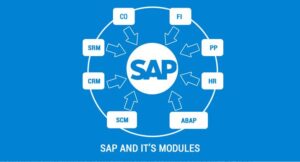Why should I choose SAP training for career development?
If you wonder how you can improve your career, then you’ve no doubt heard of SAP training. Perhaps you have read a job description that listed SAP skills as requirements, or maybe someone you work with said it’s really important in their position. But what is SAP? And why do so many people see it as a career game-changer? Let’s break it down in plain, human terms.

Begin With The Basics: What is SAP?
Table of Contents
ToggleSAP is short for Systems, Applications, and Products in Data Processing. It’s essentially the software tools that businesses need to run smoothly. Picture it as the nervous system for a company; it ties together finance, HR, supply chain, sales, and more in one big integrated platform.
Over 400000 companies across the globe are using SAP, and here is the catch: All of them require proficient professionals manning these systems, customising them, and keeping them up-to-date. That is when SAP training can be of help.
Why SAP Training Can Take Your Career To A New Level
1. The Demand is Real
Firms everywhere need SAP experts. Banks, hospitals, manufacturers, and retail giants are running on SAP. Once you have SAP training, employers searching for that skillset will find you to be more appealing.
2. It Pays Off
Come on – salaries matter. Some of the highest-paid jobs in the IT and business industry are held by SAP professionals. Multiple sources indicate that qualified SAP consultants can make between 20 and 30 percent more than their counterparts. That can be a tremendous advantage if one of your career goals is financial growth.
3. You are Not Bound to a Single Country
SAP is present in over 180 countries, thereby making your skills international. If you have dreamt of working abroad or with an international firm, the SAP course can make it happen.
4. Many Paths to Specialize
One neat thing about SAP is that it is not a single system. There are separate modules for each aspect of the business:
- SAP FI — Financial and Accounting Integration/Management
- SAP HCM for human resources
- SAP MM (Material management) for the Procurement of products and supply chain flow :
- SAP SD sales and distribution
- SAP ABAP for programming and development
So, whether you are a finance, HR, logistics, or IT professional by background, there is a module that plays to your strengths.
5. Stand out in a crowd
SAP skills set an individual apart on a resume. An employer knows that such a certificate is not easy to attain; therefore, it connotes commitment, competent knowledge, and, more so, competence in business processes.
6. Practical, not theoretical
Most of the SAP courses aim primarily at preparing candidates for the real world. One is trained to use the SAP system, that is, to solve problems, handle data, or smooth business processes. So, one is job-ready from the day they graduate.
7. It is Not Just for the IT Folks
Mythbuster: There is no programming or tech know-how requirement for learning SAP. If you belong to the finance team, HR department, or the supply chain, there are modules that speak directly to your business; if doing tech work is your passion within this, there’s always something for you.
8. Keep Your Career Updated
The business world moves fast- automation, cloud technology, artificial intelligence, analytics, and what-have-you. SAP is continuously updated to keep in track with this trend. Learn SAP, and assure yourself that your skills will stay marketable for some time.
What would SAP training do for your career?
These are some benefits:
Job Security: Investing heavily in SAP means the demand for trained professionals is always there.
Recognition: SAP certifications are recognized around the globe.
Faster Growth: SAP personnel are often given promotions and assigned to leadership roles sooner.
Networking: SAP communities allow you to network globally.
How to Get Started
Choose your module – Select one according to your background or interests.
Find your training center – A respected institute that offers SAP training with good hands-on practice.
Consider the certification – It’s not always necessary, but certification increases credibility.
Keep learning – SAP continues to evolve, so updates are a must.
Final Words
So, why should one opt for SAP training for career development? Simply put, it opens the doors. If you want to earn more, work internationally, or at least just have confidence that your skills are not outdated, SAP training puts you there. It’s not just a line on your resume; it’s an up-front investment in your career.
FAQs
Do only those from technology backgrounds train for SAP?
No. While the technical modules might go down well with IT guys, SAP has a lot of other modules focused on business, finance, HR, logistics, and so on.
How much time will I require for learning SAP?
It depends upon the module and the kind of training that one undergoes. Typically, one could be attending courses for 8-12 weeks, and the advanced training can be longer.
Do I need any experience to begin SAP training?
Not necessarily. Beginners can start with some basic modules, whereas experienced professionals can directly take on advanced or specialized modules.
Will SAP training give me a job?
Training, per se, does not guarantee a job. But it stands the best chance to help you get a job; in other words, the training equips you well to grab that job. Consider it a strong key: it opens as many doors as are put forth by your efforts in sending resumes, networking, and seeing through interviews.
Dont Hesitate To Contact Us
Recent Post









